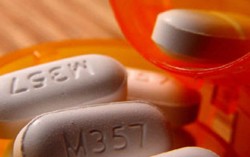Vicodin Detox
Vicodin is a painkiller that is part of the opiate class of drugs which has a wide potential for abuse and to cause physical dependence. According to the National Institute on Drug Abuse, Vicodin is one of the most widely abused prescription painkillers available on the market second in line only to Oxycodone and Oxycontin. This drug can create extreme physical dependence which results in the need for Vicodin detox when the user tries to quit
Getting help when you realize it’s time to get sober is vital to success in recovery. Unfortunately, of the millions of people who suffer from addiction, the majority do not get help immediately when they need it. In fact, many never receive the help that they need and those who do get help often relapse many times before finally getting sober.
What is Vicodin?
Vicodin is a painkiller that is available by prescription for the treatment of mild to moderate pain. This drug is often prescribed following dental procedures, minor injuries or minor surgical procedures. Patients who take the drug often find themselves suffering from physical dependence without ever even realizing that there was a risk of addiction occurring. This is one of the greatest dangers of Vicodin abuse as many users don’t think that the drug is one in which they will be likely to become addicted to.
Vicodin use can lead to increased tolerance after just a few times of taking the drug. Repeat use for a prolonged period of time almost certainly leads to addiction. When a user become physically dependent on Vicodin, he or she will experience a wealth of withdrawal symptoms that can make abstinence a very challenging process at best.
Symptoms of Vicodin Addiction

Vicodin detox can help you have a successfully recovery.
A variety of symptoms can become present when a user becomes addicted to Vicodin. The most common symptoms include:
- Increased tolerance and the need to use more vicodin to produce the same effects
- Withdrawal symptoms when the user stops taking Vicodin or attempts to lower the dose
- Frequent refills for prescriptions or doctor shopping to get more drugs
- Hiding drug use, level of drug use or the drugs themselves from others
- Telling lies, stealing or otherwise reacting poorly to get more drugs or as a result of using Vicodin
- Not accepting any other painkiller except vicodin
Vicodin Withdrawal Symptoms
Abstinence from Vicodin can lead to withdrawal symptoms that make staying sober a challenging process. The user will feel sick, irritable, anxious or in pain when he or she doesn’t have Vicodin. The withdrawal symptoms can begin as soon as the last pill is taken and they may last for up to 10 days or more depending on the severity of the addiction and other factors.
Vicodin withdrawal symptoms include:
- Diarrhea
- Nausea
- Vomiting
- Upset stomach or cramps in the stomach
- Irritability
- Agitation
- Anxiety
- Sweating and hot flashes
- Flu-like symptoms
- Runny nose or watery eyes
Vicodin Detox Programs
The safest and most effective way to overcome Vicodin addiction is to undergo detox. Vicodin detox will consist of spending time in a residential setting where the patient will be continuously monitored for his or her own well-being mentally and physically. Vicodin withdrawal can pose serious challenges in treatment which is why Vicodin detox programs are best suited to help patients in a hospital-like setting.
Vicodin detox programs provide specialized treatment for addiction to Vicodin. These programs may be able to offer help for other forms of opiate addiction such as heroin addiction or prescription painkiller addiction but there are no guarantees. It’s important that you seek a program of treatment that:
- Understands the addiction
- Has treated the addiction before
- Is affordable for you
- Provides the right level of care for you
- Offers treatment for any underlying medical needs or conditions that you may have
- Offers help for dual-diagnosis if you suffer from such a condition
- Can provide you with support and care that meets your needs and exceeds your expectations
Not all Vicodin detox programs are the same. Some utilize natural approaches to recovery while others may focus on holistic treatment and care. If you’re suffering from other types of drug or alcohol addiction in addition to your Vicodin dependence, you’ll want to be sure to choose a detox program that will provide you with treatment for these underlying health or substance abuse disorders too.
What Happens Next?
Once you’ve safely overcome physical dependence on Vicodin, you’ll be ready to get treatment for the psychological elements of the addiction. This treatment will be a long-term, ongoing process that includes counseling and therapy. Experts believe that the best chance an addict has at staying sober will be to receive psychological counseling, behavioral therapy and other forms of therapeutic care following detox to ensure that they heal both physically and psychologically from the pain caused by the addiction as well as from the pain that may have been present prior to the addiction.
Addiction to Vicodin is a dangerous disease but there is help. Overcoming addiction to Vicodin, putting your best foot forward and moving on with your life begins with Vicodin detox!

